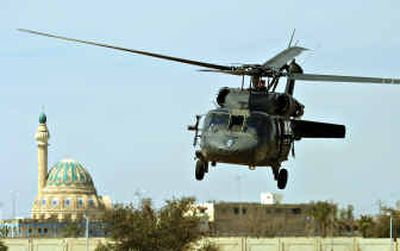Four Iraqi police killed on anniversary of invasion

BAGHDAD, Iraq – Insurgents killed an Iraqi police officer Saturday and later bombed his funeral procession, killing three other policemen. The violence came as President Bush proclaimed that Iraq “is no longer a threat to the world” and tens of thousands of protesters abroad called for a withdrawal of foreign troops on the second anniversary of the U.S.-led invasion.
The roadside bombing in the northern city of Kirkuk was the latest to follow an increasingly common insurgent tactic of targeting funerals, and Iraqi security forces rather than U.S. troops. Police said the officer being buried had been sprayed by automatic weapons fire while driving to work.
One of those killed at his funeral was identified as a cousin of Jalal Talabani, a Kurdish leader who is expected to become Iraq’s next president.
Gunmen also killed a regional police commissioner on his way to his office in Baghdad. And 70 miles to the west, a suicide bomber blew himself up before his car reached its apparent target, a U.S. military patrol on a highway near Ramadi, the U.S. military said. No one other than the bomber was reported hurt.
The invasion that Bush unleashed on March 19, 2003, toppled Saddam Hussein’s dictatorship but spawned a violent resistance that shows little sign of letup. Led by elements of Saddam’s disempowered Sunni Arab sect, the insurgency has killed more than 1,500 U.S. troops and about 1,300 soldiers and policemen serving the U.S.-backed interim Iraqi government, officials say. Thousands of Iraqi civilians have been killed in the fighting.
Iraq held no official commemoration Saturday of the U.S. invasion, which began here in the early hours of March 20. But many Muslim clerics mentioned the anniversary in their weekly Friday sermons while defending the insurgents.
“People have an internationally recognized right to defend their country,” Sheik Ahmed Taha Samarraiy told worshippers in a predominantly Sunni district of Baghdad, adding that the insurgents should not target civilians who are their “Muslim brothers.”
Bush used his weekly radio address to mark the anniversary. “We knew of Saddam Hussein’s record of aggression and support for terror,” he said. “We knew of his long history of pursuing, even using, weapons of mass destruction, and we know that Sept. 11 requires our country to think differently.
“Now, because we acted, Iraq’s government is no longer a threat to the world or its own people,” Bush added, without mentioning the failure to uncover chemical, biological or nuclear weapons here. He said Iraq’s recent election of a National Assembly was “inspiring democratic reformers” across the Middle East.
Bush repeated the aim of bringing U.S. troops home once enough Iraqi security forces have been trained, but he mentioned no timetable.
Gen. Richard B. Myers, chairman of the Joint Chiefs of Staff, said Thursday that the insurgents’ ability to mount deadly attacks had weakened in the seven weeks since the election. Vice Adm. Lowell Jacoby told the Senate Armed Services Committee the same day that the number of insurgent attacks had diminished in that time from about 60 per day to about 50 per day, but he cautioned that, “It is too early to say whether this is the trend.”
There has been no major insurgent attack since March 10, when a suicide bomber blew himself up outside a Shiite mosque in the northern city of Mosul, killing 47 people.
The violence has been aimed less at U.S. forces and more at the Shiite Muslims and Kurds who are filling the ranks of Iraq’s army and police forces and are expected to lead the government.